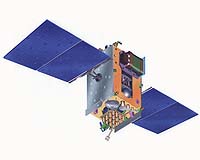 |
Minnetonka MN (SPX) Oct 13, 2009 Digi International has introduced the Digi m10 JumpStart Kit, the industry's first cost-effective development kit that provides all of the tools necessary, including ORBCOMM trial satellite service, to allow customers to quickly and easily build satellite-enabled products. Ideal for transportation, asset tracking and other applications where cellular coverage is inconsistent but access to remote data is important, Digi m10 JumpStart Kits make satellite communications more accessible and easier to deploy than ever before. "We are combining our expertise in providing affordable, easy to use kits and our global distribution network with satellite technology," said Larry Kraft, senior vice president of global sales and marketing, Digi International. "For the first time, organizations interested in deploying satellite have access to a cost effective, easy-to-use, turn-key solution. Our kits make it easier than ever to deploy low-cost satellite connectivity for machine-to-machine (M2M) applications such as relaying diagnostic information on trucks, trailers, heavy equipment, utility meters, marine vessels and other remote assets." "We are proud to be partnering with Digi, one of the world's most respected manufacturers of products and technology for M2M applications," said Marc Eisenberg, Chief Executive Officer at ORBCOMM. "Digi's broad distribution channels and extensive technical capabilities provide opportunities for ORBCOMM to expand its addressable markets and reach new users." Operating on the ORBCOMM low-earth orbit (LEO) satellite network, Digi m10 JumpStart kits enable cost-effective M2M communication with global coverage capability. This allows companies to monitor and manage remote assets deployed in locations where cellular or other land-based communications are not available. The products can also be used to enable backup connectivity for cellular-based products. "Low data rate M2M services are the fastest growing part of the Mobile Satellite Services (MSS) industry, and this market is expected to more than double in size reaching over three million active terminals worldwide by the end of 2013," said Tim Farrar, President of TMF Associates, a consulting firm which specializes in mobile satellite communications. "In order to sustain this high level of growth, it will be important to develop new applications and open up additional market segments for satellite M2M. Previously, end users have often found it difficult and time consuming to customize M2M applications to meet their needs, and Digi's new JumpStart kits will help to make this process both cost effective and easy." Built on Digi's patented mixed signal ASIC to enable higher performance and reduced power consumption for satellite applications, the compact Digi m10 is the industry's smallest ORBCOMM satellite modem and offers immediate design integration through its integrated serial interface. Because it is designed with patented Digi technology, long-term product availability is ensured. With full support for industrial temperature and operational shock/vibration specifications exceeding SAE J1455, the modem is ideal for reliable satellite connectivity in the most demanding environments. Share This Article With Planet Earth
Related Links Digi International Space Technology News - Applications and Research
 ISRO Develops Tech To Boost Satellite Life By 5 Years
ISRO Develops Tech To Boost Satellite Life By 5 YearsBangalore, India (PTI) Oct 02, 2009 For the first time, India's space scientists have developed electric propulsion technology that is expected to boost the life of geostationary satellites by upto five years. In other words, the satellites which today have a lifespan of ten years, could last upto 15 years. The system - plasma thrusters - would be tested in GSAT-4 spacecraft slated to be launched on board GSLV later ... read more |
|
| The content herein, unless otherwise known to be public domain, are Copyright 1995-2009 - SpaceDaily. AFP and UPI Wire Stories are copyright Agence France-Presse and United Press International. ESA Portal Reports are copyright European Space Agency. All NASA sourced material is public domain. Additional copyrights may apply in whole or part to other bona fide parties. Advertising does not imply endorsement,agreement or approval of any opinions, statements or information provided by SpaceDaily on any Web page published or hosted by SpaceDaily. Privacy Statement |